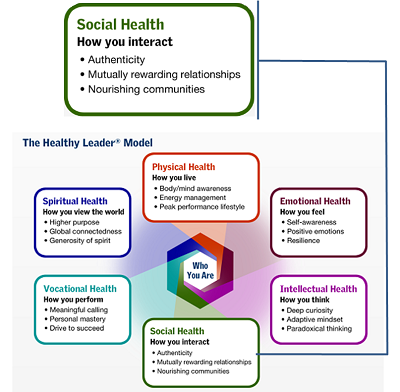When you walk in the room, who shows up for Read more →
The Leader’s Social Health
Posted Tuesday, May 14, 2013Allen Slade
Many skills can be put into action without others. We can solve math problems solo. We can read by ourselves. We can create words or visual art alone.
Leadership is not a solo skill. We lead in relationship to others. Our ability to build strong relationships determines our ability to lead. Furthermore, it is not just creating a good first impression that matters. Sustainable leadership requires sustained healthy relationships.
It’s not today’s encounter or today’s sale that matters. It’s all the encounters and the relationships that are going to be fed from today’s sale. If I just care about today’s sale or today’s encounter or today’s exchange, I may make different decisions that affect my whole future. Relationships take a long time to build, and they can be broken very easily.
Atina Diffley Author, public speaker and former organic farmerAs a leader, your health is central to who you are as a leader. In my previous posts on The Healthy Leader® model (created by Bob Rosen of Healthy Companies International), we have considered the leader’s physical, emotional and intellectual health. Healthy leadership also requires social health.
Modified from an image courtesy of Healthy Companies Inc.
Authenticity
Authenticity is being your true self with those you lead. At your best as a leader, you are fully yourself.
Inauthentic leaders rarely set out to deceive. Instead, they compartmentalize or suppress. They may have a work compartment and a home compartment, or they may suppress emotions or thoughts that don’t fit the image they want to project.
Compartmentalizing or suppressing parts of yourself gives off mixed signals. You try to keep value judgments private or hide your annoyance with someone. If you are not a trained actor or a professional poker player, you probably are only partially successful. People may not know specifically what you are hiding, but they are likely to know you are hiding something.
To be authentic, you must be open. Be vulnerable. Let down your defenses. Let others know the real you. It takes courage to open up, but your social health will grow.
Another key to authenticity is consistency. You need to act in similar patterns across time. Your actions should be consistent with your thoughts and emotions. And, your actions need to be consistent with your values and ethics.
Being a better actor is no substitute for authenticity. I worked for a senior executive who launched a new organization. She told a moving story about how she worked with her stepdaughters to pull together as a family. Despite implying domestic happiness, she was separated from her husband and had not seen her stepdaughters for weeks. Yet, she used warm facial expressions, synchronized body movements and perfect tone of voice. Because she was a talented actor, I never totally trusted her again.
When coaching clients ask me how to act differently, I often reply “I don’t give acting lessons.” If you want to act a certain way, you must be that way. If you want to act confident, be confident. If you want act positively, don’t just fake a smile. Notice what is positive in a situation – what is good, true, effective and beautiful. If you want to act as if you are authentic, be transparent and consistent.
Mutually Rewarding Relationships
Healthy relationships are reciprocal relationships. A healthy leader builds relationships that are fair and mutually rewarding. It is not sustainable to treat others as tools to meet your own needs. The socially healthy leader will be quick to help, quick to listen and quick to celebrate the success of others.
Healthy leaders are also open to the perspectives of others. They seek the input of others when making a decision, and they seek feedback about how they are showing up for others.
A healthy leader tends to assume others are acting with positive intent. The leader operates with goodwill, even when there is no “proof” the other person is worthy of being trusted.
Investing in reciprocal relationships tends to pay off. Treating others as trustworthy tends to make you trusted. Seeking input leads to better decisions. Seeking feedback leads to faster growth. Assuming positive motives for others can lead them to grant you goodwill. In other words, mutually rewarding relationships are, well, rewarding.
Nourishing Communities
Humans were created for connections. Couples, families, towns. Sports teams, farmers’ markets, concert audiences. Fire departments, ad agencies, car companies. We come together for good.
As a healthy leader, you do not merely prosper in community. You create healthy communities. You promote collaboration. You identify counterproductive group dynamics and work to improve them. You leverage communities (the power of “&”) to create good, and in doing so, you create joy.
Bottom line: Your social health as a leader flows from authenticity, mutually rewarding relationships and nourishing communities. Your social health invigorates your business success by attracting people to you and your positive vision for the future.


